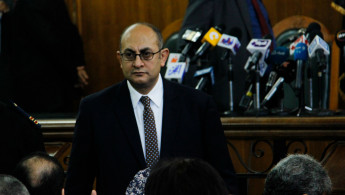Egypt presidential hopeful Khaled Ali calls for new election law amid crackdown on Sisi challengers
An Egyptian presidential hopeful is proposed a new election law aimed at ensuring a free and transparent vote next year.
Rights lawyer Khaled Ali told a packed news conference on Tuesday that a free election requires "real guarantees that include lifting the emergency state" imposed since April.
He is also demanding the release of jailed journalists and the opening of public spaces for political activism.
President Abdel Fattah al-Sisi is widely expected to run for and win a second four-year term, but he has yet to formally announce his candidacy.
Ali could be disqualified from running over an obscenity conviction.
Last week, a military court sentenced an army colonel to six years in prison after he announced his intention to run against Sisi.
Another potential candidate is Ahmed Shafiq, a retired air force general who served as the last prime minister under dictator Hosni Mubarak, ousted in a popular uprising in 2011.
Sources have told The New Arab that Shafiq is being held in Cairo's JW Marriott hotel by military police since he was deported by authorities in the United Arab Emirates.
The former general was forced to leave the Gulf country - where he had been living in exile since 2012 - after he announced his intention to run in next year's election.
Shafiq has since said he needs to "further study" his plans before he makes a final decision on whether he will run.
Egypt has waged a massive crackdown on dissent since Sisi led the military overthrow of an elected but divisive Islamist president in 2013.
Sisi is certain to run in next year's election, although he has not formally announced his candidacy yet.
The authorities under Sisi had launched a bloody crackdown on the Muslim Brotherhood group that extended to secular and non-Islamist dissidents as well.





 Follow the Middle East's top stories in English at The New Arab on Google News
Follow the Middle East's top stories in English at The New Arab on Google News
![The UAE is widely suspected of arming the RSF militia [Getty]](/sites/default/files/styles/image_330x185/public/2024-11/GettyImages-472529908.jpg?h=69f2b9d0&itok=Yauw3YTG)
![Netanyahu furiously denounced the ICC [Getty]](/sites/default/files/styles/image_330x185/public/2024-11/GettyImages-2169352575.jpg?h=199d8c1f&itok=-vRiruf5)
![Both Hamas and the Palestinian Authority welcomed the ICC arrest warrants [Getty]](/sites/default/files/styles/image_330x185/public/2024-11/GettyImages-2178351173.jpg?h=199d8c1f&itok=TV858iVg)